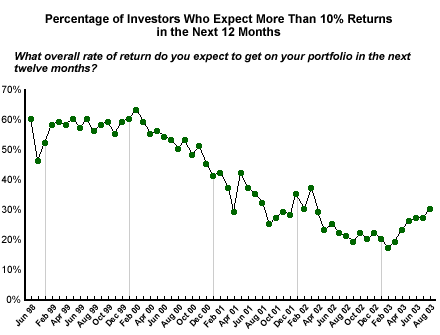Warren Buffet went on record in 1999 and 2001 saying that investors should expect stock market returns of no more than 7% in the next two decades. Forecasting the potential dividend yield and earnings growth for the S&P 500, Cliff Asness, the managing principal at AQR Capital, came up with nearly the same number.
While the experts use potential dividend yield, corporate earnings, and GDP growth to come up with these estimates, another approach to predicting rates of return is to simply ask investors for their opinions. As a part of the most recent UBS/Gallup Index of Investor Optimism survey*, Gallup asked investors to estimate the annual rate of return they think the stock market will provide over the next 10 years.

Returns: Past, Present and Future
Our results show that on average, American investors expect a 14.3% return on equity investments, more than twice what the experts project. Interestingly, "substantial" investors -- those with more than $100,000 in investable assets -- were more conservative in their expectations than the less affluent investors ("average" investors) Gallup surveyed. Substantial investors expect annual returns of only 12.2% over the next decade, compared to the 15.7% returns expected by average investors.
Put in the context of past performance of equity markets though, both the substantial and the average investors Gallup surveyed seem to have expectations for long-term returns that are unrealistic. Their expectations closely mirror the actual performance of the markets in the period from 1982 to 1999 (13.6% real annual compounded growth, Jeremy Siegel, Wharton School of Business) and clearly reflect the unprecedented expansion of the 1990s.
While historical fact suggests that annual stock market returns in the range of 7% are more likely, the limitations of using historical fact to make forward-looking projections are obvious. And yet when Asness built forward-looking estimates of dividend yields, capital gains, and inflation into his projection of future stock market returns, he arrived at a number close to the 7% that historical fact suggests.
Short Term: On the Money
While analysts believe they can predict stock market returns over the long term, the volatility of returns in the near term makes them difficult to forecast over a 6- to 12-month period. But the UBS/Gallup Index of Investor Optimism routinely measures investor expectations for short-term returns, and historical results have shown that their predictions tend to be fairly accurate.
The Index reveals that in the late 1990s, nearly three in five investors surveyed expected short-term equity returns north of 10%. The percentage of investors with this expectation fell to a six-year low of 17% in February 2003, and has recovered to 30% as of August. With a steady stream of positive economic releases and the markets poised for a recovery in the second half of the year, it seems that the investors are preparing for double-digit growth in their stock portfolios.

Bottom Line
While investors may be on target in terms of their short-term expectations of stock market performance, their expectations for returns over the 10-year horizon are likely to be overly optimistic. With more than 80 million Americans invested in equities and three-fourths of all investable assets in the country in the securities markets, this overly optimistic expectation could be a costly one. As Americans make investment decisions, allocate assets, or plan for retirement, their assumption of long-term stock market returns is one they need to reconsider.
*Results for the Index of Investor Optimism -- U.S. are based on telephone interviews with a randomly selected U.S. sample of 803 adult investors, aged 18 and older, with at least $10,000 of investable assets, conducted Aug. 1-14, 2003. For results based on these samples, one can say with 95% confidence that the maximum error attributable to sampling and other random effects is ±4 percentage points. In addition to sampling error, question wording and practical difficulties in conducting surveys can introduce error or bias into the findings of public opinion polls.

